Discover tranquility with these herbal tea blends for restful sleep. Try chamomile and valerian root for relaxation, or sip on lemon balm tea to soothe your nighttime routine. Passionflower dream elixir and lavender-mint infusion can calm your mind, while hops and skullcap create a potent sleep tonic. California poppy brew offers gentle sedation, and ashwagandha tea helps manage stress. Holy basil promotes tranquility, magnolia bark enhances sleep quality, and a catnip-oatstraw blend induces relaxation. Remember to steep your chosen blend for 5-10 minutes and enjoy 30 minutes before bedtime. Exploring these herbal remedies can open the door to countless nights of peaceful slumber.
Chamomile and Valerian Root Blend
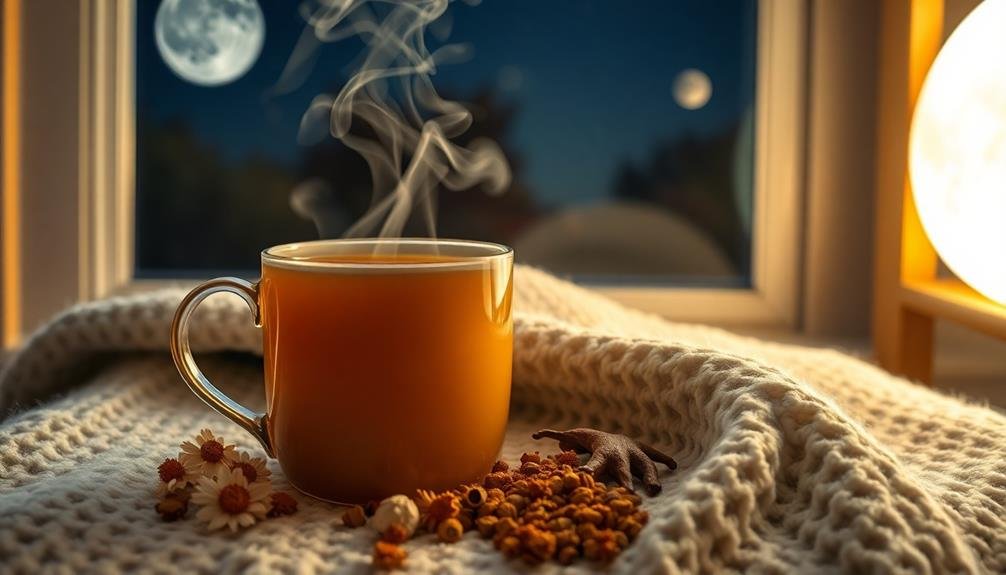
Blending chamomile and valerian root creates a potent sleep-inducing tea. These two herbs work synergistically to promote relaxation and improve sleep quality.
Chamomile, known for its gentle calming effects, contains apigenin, a compound that binds to specific receptors in your brain, reducing anxiety and initiating sleep. Valerian root, on the other hand, increases the levels of gamma-aminobutyric acid (GABA) in your brain, which helps regulate nerve impulses and induces drowsiness.
To prepare this blend, you'll need equal parts dried chamomile flowers and valerian root. Steep one teaspoon of the mixture in hot water for 5-10 minutes. It's best to drink this tea about 30 minutes before bedtime to allow the herbs time to take effect.
You may notice a slightly earthy taste from the valerian root, which can be balanced by adding a touch of honey or lemon if desired. Regular consumption of this herbal blend can help establish a consistent sleep routine.
However, it's important to consult with your healthcare provider before incorporating any new herbal remedies into your routine, especially if you're pregnant, nursing, or taking medications.
Lemon Balm Relaxation Tea
You'll find lemon balm tea to be a soothing choice for your nighttime routine, with its mild sedative and anxiety-reducing properties.
To brew the perfect cup, steep fresh or dried lemon balm leaves in hot water for 5-10 minutes, adjusting the strength to your preference.
For enhanced flavor and relaxation benefits, consider combining lemon balm with complementary herbs like chamomile, lavender, or mint.
Calming Lemon Balm Benefits
Lemon balm, a fragrant herb from the mint family, offers a soothing remedy for restless nights. This versatile plant boasts a range of calming benefits that can help you unwind and prepare for a peaceful slumber. When brewed into a tea, lemon balm's natural compounds work to reduce anxiety, promote relaxation, and improve sleep quality.
You'll find that lemon balm tea can:
| Benefit | How it Helps |
|---|---|
| Reduce stress | Lowers cortisol levels |
| Ease anxiety | Enhances GABA activity |
| Improve mood | Boosts serotonin production |
| Enhance sleep | Increases melatonin release |
By incorporating lemon balm tea into your nightly routine, you're giving yourself a natural way to combat insomnia and restlessness. Its mild sedative effects can help you fall asleep faster and enjoy a more restful night. Additionally, lemon balm's antioxidant properties support overall health, potentially reducing inflammation and boosting your immune system.
For best results, steep 1-2 teaspoons of dried lemon balm leaves in hot water for 5-10 minutes before bedtime. You can also combine it with other calming herbs like chamomile or lavender for an even more potent sleep-inducing blend.
Preparing the Perfect Brew
Once you've gathered your lemon balm leaves, it's time to create the perfect relaxation tea. Start by using fresh leaves whenever possible, as they contain the highest concentration of beneficial compounds. If you're using dried leaves, you'll need about 1-2 teaspoons per cup of water.
Bring fresh, filtered water to a gentle simmer, not a rolling boil. This prevents the delicate lemon balm from becoming bitter.
Place your lemon balm leaves in a tea infuser or directly in your cup. Pour the hot water over the leaves and cover the cup with a small plate or lid to trap the steam and essential oils.
Let the tea steep for 5-10 minutes, depending on your desired strength. The longer it steeps, the stronger the flavor and effects will be.
Remove the leaves or infuser and add a touch of honey if you'd like to sweeten it naturally. Sip your tea slowly, taking deep breaths to inhale the aromatic steam.
For maximum relaxation, enjoy your lemon balm tea about 30 minutes before bedtime, allowing its calming properties to take effect as you wind down for the night.
Complementary Herbs and Flavors
While lemon balm shines as the star of this relaxation tea, several complementary herbs can enhance its soothing effects and add depth to the flavor profile.
Consider adding chamomile for its mild, apple-like taste and calming properties. Lavender introduces a subtle floral note and promotes relaxation, while passionflower contributes a slightly sweet flavor and may help reduce anxiety.
To balance the herbal notes, you can incorporate natural sweeteners like stevia or honey. A touch of vanilla extract can add warmth and complexity to the blend. For a citrusy twist, try adding a small amount of dried orange peel or lemongrass.
When experimenting with these complementary herbs and flavors, remember to start with small amounts and adjust to your taste preferences. You'll want to maintain the delicate balance of flavors without overpowering the lemon balm's signature taste.
Here are three reasons to explore complementary herbs in your lemon balm relaxation tea:
- Discover new flavor combinations that delight your senses
- Enhance the tea's relaxation properties for a more restful sleep
- Create a personalized blend that reflects your unique taste and needs
Passionflower Dream Elixir
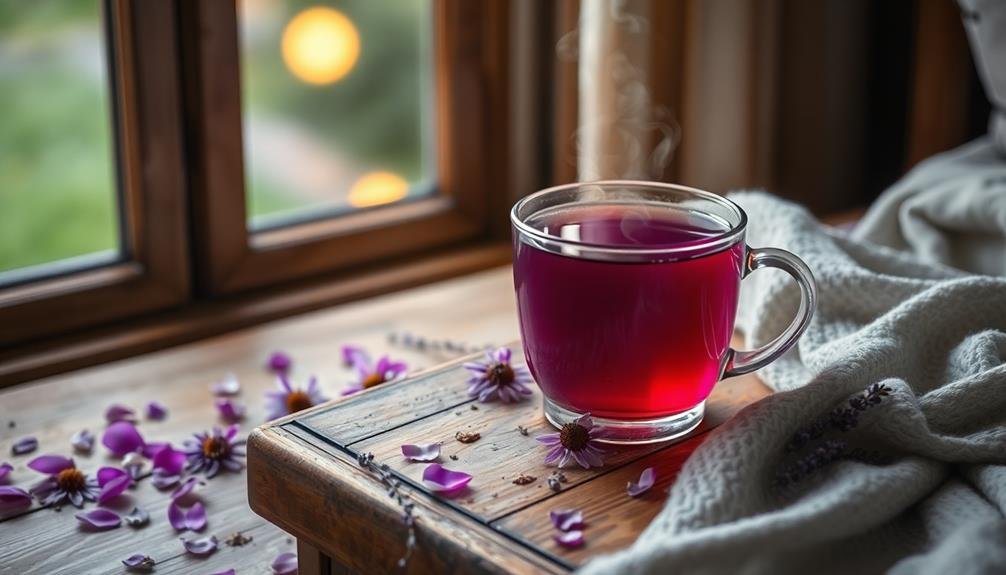
Passionflower, a key ingredient in this dream elixir, has been used for centuries to promote relaxation and improve sleep quality. You'll find that this herb contains compounds that increase GABA levels in your brain, helping to reduce anxiety and induce calmness.
To create the Passionflower Dream Elixir, you'll need to combine dried passionflower with complementary herbs. Start with 1 teaspoon of passionflower, then add 1/2 teaspoon each of chamomile and lemon balm. These herbs work synergistically to enhance the sedative effects and provide a pleasant taste.
For added flavor and benefits, consider including a small pinch of lavender or a slice of dried orange peel. Steep the mixture in hot water for 5-7 minutes, then strain and enjoy about 30 minutes before bedtime.
You can customize this blend to suit your preferences. If you find the taste too floral, try adding a touch of honey or a dash of vanilla extract. For those who are sensitive to herbs, start with a smaller amount of passionflower and gradually increase as needed.
Lavender and Mint Calming Infusion
Another soothing blend to add to your nighttime tea repertoire is the Lavender and Mint Calming Infusion. This aromatic combination harnesses the relaxing properties of lavender with the invigorating coolness of mint to create a tranquil beverage perfect for winding down before bed.
To prepare this infusion, you'll need dried lavender buds and fresh or dried peppermint leaves. Steep a teaspoon of each in hot water for 5-7 minutes, then strain and enjoy. The lavender's floral notes help reduce anxiety and promote relaxation, while the mint aids digestion and provides a gentle coolness that can help lower your body temperature, signaling to your body that it's time for sleep.
This blend offers more than just a pleasant taste:
- It envelops you in a soothing aroma, transporting you to a peaceful lavender field.
- It creates a comforting ritual, helping you shift from day to night.
- It provides a moment of self-care, allowing you to nurture your body and mind.
Drink this infusion about an hour before bedtime to give the herbs time to work their magic. You'll find yourself drifting off to sleep more easily and experiencing a more restful night's slumber.
Hops and Skullcap Sleep Tonic
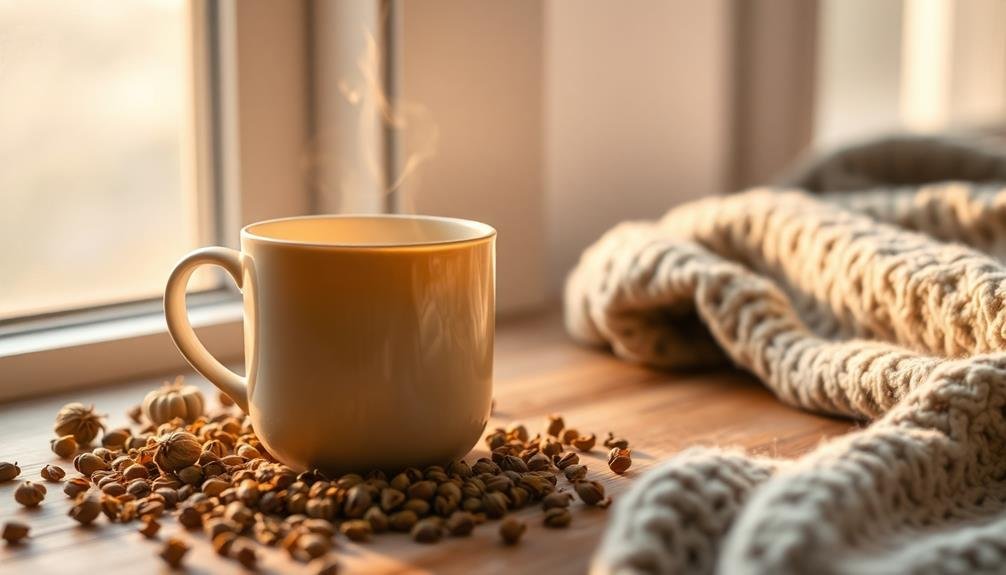
For those seeking a potent sleep aid, the Hops and Skullcap Sleep Tonic packs a powerful punch. This blend combines two renowned herbs known for their sedative properties. Hops, famous for its use in beer brewing, contains compounds that promote relaxation and reduce anxiety. Skullcap, a lesser-known herb, has been used for centuries to treat insomnia and nervous tension.
To prepare this tonic, you'll need:
| Ingredient | Amount | Steep Time |
|---|---|---|
| Dried Hops | 1 tsp | 5 minutes |
| Skullcap | 1 tsp | 5 minutes |
| Hot Water | 8 oz | – |
Steep the herbs in hot water for 5 minutes, then strain and enjoy. You'll find the taste slightly bitter, with earthy and floral notes. For best results, drink this tea 30-60 minutes before bedtime.
This potent blend may cause drowsiness, so avoid driving or operating machinery after consumption. If you're taking medication or have a medical condition, consult your healthcare provider before using this tonic. Remember, while herbal remedies can be effective, they're not a substitute for addressing underlying sleep issues or maintaining good sleep hygiene.
California Poppy Slumber Brew
You'll find California Poppy to be a gentle yet effective herb for promoting restful sleep.
To brew the perfect poppy tea, steep 1-2 teaspoons of dried California Poppy in hot water for 10-15 minutes.
For an enhanced sleep-inducing blend, you can combine California Poppy with complementary herbs like chamomile, lavender, or lemon balm.
California Poppy's Sleep Benefits
California poppy, a gentle yet effective sleep aid, offers a natural solution for those struggling with insomnia or restless nights. This golden flower's sedative properties can help you drift off to sleep more easily and improve your overall sleep quality.
Unlike stronger sleep medications, California poppy doesn't leave you feeling groggy the next day, making it an excellent choice for those seeking a more balanced approach to sleep support.
The benefits of California poppy for sleep extend beyond simply helping you fall asleep faster. It can also:
- Reduce anxiety and racing thoughts that often keep you awake
- Promote deeper, more restorative sleep cycles
- Alleviate mild pain that may interfere with your ability to rest
When brewed as a tea, California poppy's calming effects are easily absorbed by your body.
You'll notice a gradual sense of relaxation as you sip the warm, slightly bitter brew. For best results, drink a cup about an hour before bedtime. This allows the herb's natural compounds to take effect, preparing your mind and body for a peaceful night's rest.
Brewing Perfect Poppy Tea
Preparing the perfect California poppy tea requires attention to detail and a gentle touch. Start by selecting fresh or dried California poppy flowers, leaves, and stems. For a single cup, use about 1 teaspoon of dried herb or 2 teaspoons of fresh plant material.
Bring water to a near-boil, around 200°F (93°C). Pour the hot water over the herbs in a tea infuser or directly into your cup. Let it steep for 5-10 minutes, depending on your desired strength. The longer it steeps, the more potent the tea will be.
Once brewed, remove the herbs and add a natural sweetener like honey or stevia if desired. You can also enhance the flavor with a squeeze of lemon or a dash of cinnamon.
For a stronger brew, you can make a decoction by simmering the herbs in water for 15-20 minutes. This method extracts more of the plant's beneficial compounds.
Complementary Herbs for Blending
Several herbs can enhance the sleep-promoting effects of California poppy tea when blended thoughtfully. Chamomile, known for its calming properties, pairs well with California poppy, creating a soothing synergy. Lavender adds a floral note and further promotes relaxation. Lemon balm, with its mild citrus flavor, complements the earthy taste of poppy while contributing to stress reduction.
When crafting your blend, consider adding valerian root for its potent sedative effects. However, use it sparingly as its strong taste can overpower other flavors. Passionflower is another excellent addition, offering anxiety-reducing benefits that work in harmony with California poppy.
For a well-rounded nighttime blend, you'll want to:
- Balance flavors to create a pleasant taste
- Combine herbs with complementary sleep-promoting properties
- Adjust ratios to achieve your desired potency
Remember to start with small amounts of each herb and adjust according to your preferences.
It's important to consult with a healthcare professional before regularly consuming herbal blends, especially if you're taking medications or have existing health conditions.
With careful experimentation, you'll create a personalized California poppy blend that supports your journey to restful slumber.
Ashwagandha Stress-Relief Tea
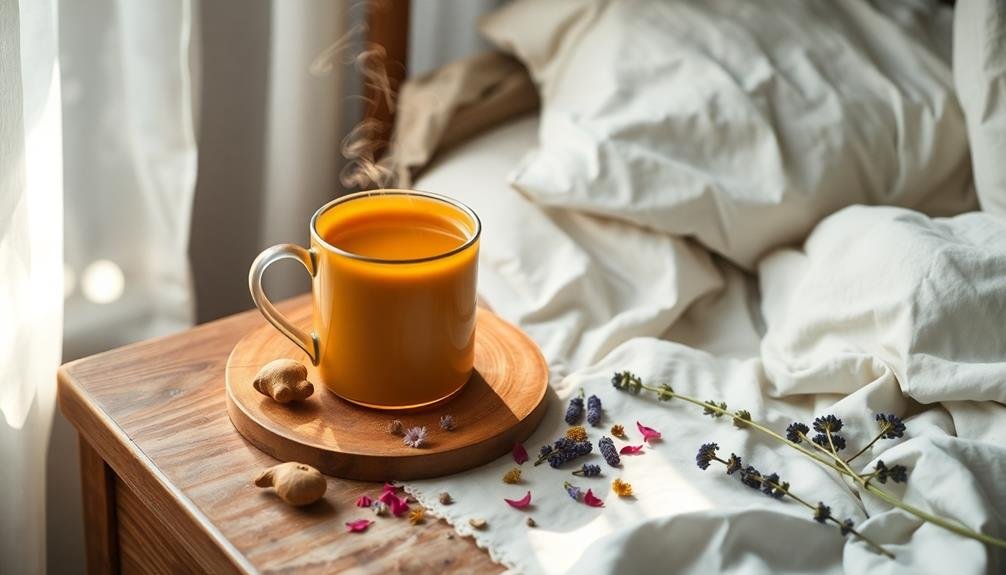
As the day winds down, Ashwagandha Stress-Relief Tea offers a soothing solution for those seeking a restful night's sleep. This ancient Ayurvedic herb, known for its adaptogenic properties, helps your body manage stress and promotes relaxation.
To create this calming blend, combine one teaspoon of ashwagandha root powder with chamomile flowers and a pinch of cinnamon. You'll find that ashwagandha's earthy flavor pairs well with the floral notes of chamomile, while cinnamon adds a touch of warmth.
Steep the mixture in hot water for 5-7 minutes, allowing the herbs to release their beneficial compounds. As you sip this tea, you'll notice a gradual sense of calm washing over you.
Ashwagandha works by reducing cortisol levels, your body's primary stress hormone. This not only helps you unwind but also improves sleep quality. Regular consumption may lead to better overall sleep patterns and reduced anxiety.
For enhanced effects, consider adding a drop of lavender essential oil or a teaspoon of honey to your brew. Remember, while ashwagandha is generally safe, it's best to consult with a healthcare professional before incorporating it into your routine, especially if you're pregnant, nursing, or taking medications.
Holy Basil Tranquility Blend
You'll find Holy Basil, also known as Tulsi, to be a powerful herb for promoting tranquility and reducing stress.
This adaptogenic herb can be combined with other calming ingredients like chamomile or lavender to enhance its soothing effects.
To brew the perfect cup of Holy Basil Tranquility Blend, you'll want to steep the herbs in hot water for 5-7 minutes, allowing the flavors and beneficial compounds to fully infuse.
Benefits of Holy Basil
Holy basil, also known as Tulsi, is a powerful herb that can greatly enhance your nighttime tea blend. This adaptogenic herb has been used for centuries in Ayurvedic medicine to promote overall well-being and reduce stress. When incorporated into your evening routine, holy basil can help you unwind and prepare for a restful night's sleep.
One of the primary benefits of holy basil is its ability to lower cortisol levels, the stress hormone that can interfere with your sleep patterns. By reducing cortisol, you'll feel more relaxed and ready for bed. Additionally, holy basil contains compounds that can help regulate blood sugar levels, preventing nighttime fluctuations that might disrupt your sleep.
Here are three emotional benefits of incorporating holy basil into your nighttime tea blend:
- Calms racing thoughts, allowing your mind to settle
- Promotes a sense of inner peace and tranquility
- Enhances overall mood, leaving you feeling content before bed
Regular consumption of holy basil tea can also boost your immune system, improve digestion, and support respiratory health.
These added benefits contribute to better overall health, which in turn can lead to improved sleep quality and duration.
Complementary Herbs
In addition to holy basil, several complementary herbs can enhance your nighttime tea blend, creating a powerful synergy for ideal relaxation and sleep. Chamomile, renowned for its calming properties, pairs exceptionally well with holy basil. Its mild, apple-like flavor complements the spicy notes of holy basil while promoting relaxation and reducing anxiety.
Lavender is another excellent addition, offering a soothing aroma and taste that can help quiet an overactive mind. Its natural sedative properties work in harmony with holy basil to promote deeper, more restful sleep.
Lemon balm, with its citrusy undertones, can help alleviate stress and improve mood, making it an ideal companion to holy basil's adaptogenic effects. For those seeking additional sleep support, valerian root can be a potent addition. While its earthy flavor may be strong, it's known for its ability to improve sleep quality and reduce the time it takes to fall asleep.
Passionflower is another herb that can enhance your blend, offering mild sedative effects and helping to calm racing thoughts. By combining these complementary herbs with holy basil, you'll create a powerful nighttime tea blend tailored to your specific sleep needs.
Brewing Perfect Cup
To create the perfect cup of Holy Basil Tranquility Blend, start with high-quality, organic ingredients. Measure out one teaspoon of dried holy basil leaves, half a teaspoon of chamomile flowers, and a quarter teaspoon of lavender buds per cup of water.
Boil fresh, filtered water and let it cool for about 30 seconds before pouring it over your herbal blend. This guarantees you don't scorch the delicate herbs and preserves their beneficial properties.
Allow the tea to steep for 5-7 minutes, depending on your desired strength. Use a fine-mesh strainer or tea infuser to separate the herbs from the liquid. For an extra touch of sweetness, you can add a small amount of raw honey or a slice of lemon to enhance the flavor profile.
Here's why brewing the perfect cup matters:
- The aroma of freshly brewed herbs calms your senses, preparing you for sleep.
- The ritual of making tea becomes a mindful practice, helping you unwind.
- Properly brewed tea maximizes the extraction of beneficial compounds, supporting your body's natural sleep processes.
Remember to sip your tea slowly, savoring each moment as you shift into a peaceful state of mind for bedtime.
Magnolia Bark Nighttime Steeper
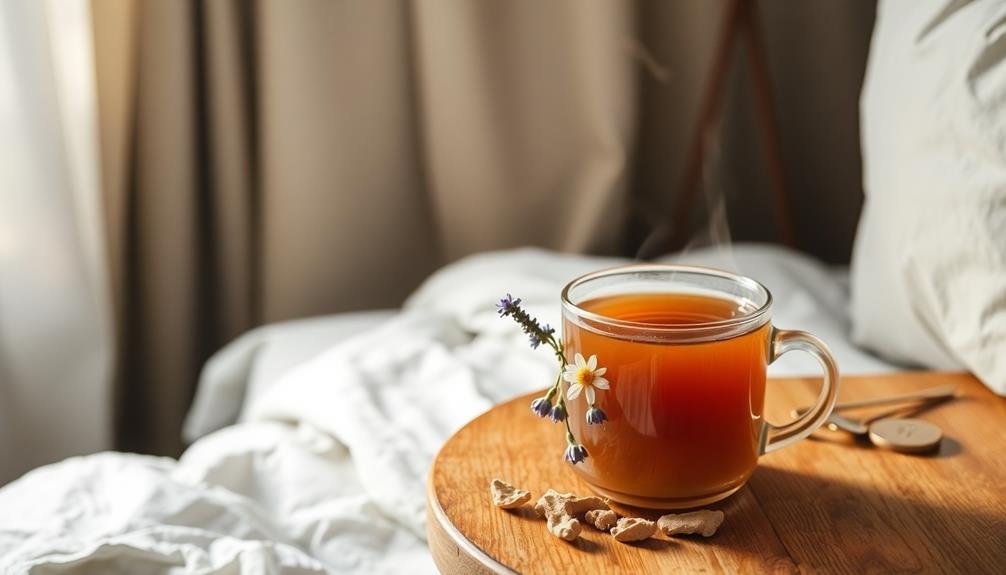
While many herbal teas can aid sleep, magnolia bark stands out as a potent natural sedative. This ancient Chinese remedy has been used for centuries to promote relaxation and improve sleep quality.
You'll find that magnolia bark contains compounds like honokiol and magnolol, which have been shown to have anxiolytic and sleep-enhancing effects.
To create a magnolia bark nighttime steeper, you'll need to source high-quality dried magnolia bark. Start by adding 1-2 teaspoons of the bark to a tea infuser or filter. Place it in your favorite mug and pour hot water (around 190°F) over it. Let it steep for 10-15 minutes to extract the beneficial compounds fully.
For a more complex flavor profile, you can blend magnolia bark with complementary herbs like chamomile, lavender, or lemon balm. These additions won't only enhance the taste but also contribute their own sleep-promoting properties.
Remember to drink your magnolia bark tea about an hour before bedtime to allow its effects to take hold. You'll likely notice improved sleep onset and duration, waking up feeling more refreshed and rejuvenated.
Catnip and Oatstraw Restful Tea
Blending catnip and oatstraw creates a powerhouse of relaxation for your nighttime tea routine. Catnip, known for its calming effects on felines, also works wonders for humans. It's a mild sedative that can ease anxiety and promote better sleep.
Oatstraw, derived from the unripened Avena sativa plant, complements catnip's properties by nourishing your nervous system and reducing stress.
To prepare this restful tea, steep one teaspoon each of dried catnip and oatstraw in hot water for 10 minutes. Strain and sip slowly before bedtime. You'll notice a subtle, earthy flavor with a hint of sweetness. For added benefits, you can mix in a touch of honey or a slice of lemon.
This blend offers more than just improved sleep. You'll experience:
- A sense of tranquility washing over you, melting away the day's tensions
- A gentle lift in mood, replacing worry with contentment
- A deepened connection to nature's healing power, nurturing your body and mind
Regular consumption of catnip and oatstraw tea can lead to long-term improvements in sleep quality and overall well-being. It's a natural, caffeine-free alternative to synthetic sleep aids, supporting your body's natural rhythms without the risk of dependency.
Frequently Asked Questions
How Long Before Bedtime Should I Drink Herbal Sleep Teas?
You'll want to drink herbal sleep teas about 30-60 minutes before bedtime. This gives your body time to absorb the beneficial compounds. Don't drink too close to sleep, as you might wake up needing the bathroom.
Can I Mix Different Herbal Tea Blends for Enhanced Sleep Benefits?
Yes, you can mix different herbal tea blends for enhanced sleep benefits. You'll want to experiment carefully, combining complementary herbs like chamomile, lavender, and valerian root. Start with small amounts and adjust to find your perfect sleep-inducing blend.
Are There Any Potential Side Effects of Drinking Sleep-Promoting Herbal Teas?
While generally safe, sleep-promoting herbal teas can have side effects. You might experience drowsiness, headaches, or digestive issues. Some herbs interact with medications. It's best to consult your doctor before regularly consuming these teas.
How Do Herbal Sleep Teas Compare to Over-The-Counter Sleep Aids?
You'll find herbal sleep teas are generally milder and have fewer side effects than over-the-counter sleep aids. They're natural, non-habit forming, and can be easily incorporated into your bedtime routine. However, they may work more slowly and subtly.
Can I Drink These Herbal Teas if I'm Pregnant or Breastfeeding?
You should be cautious with herbal teas during pregnancy or breastfeeding. Some herbs can affect your baby. It's best to consult your healthcare provider before drinking any herbal teas. They'll advise you on safe options.
In Summary
You've now discovered ten soothing herbal tea blends to help you drift off to sleep. Remember, consistency is key. Try incorporating these teas into your nightly routine for the best results. Don't be afraid to experiment with different combinations to find what works best for you. While these teas can promote relaxation, they're not a substitute for good sleep hygiene. Pair them with a calming bedtime routine for ideal rest. Sweet dreams!

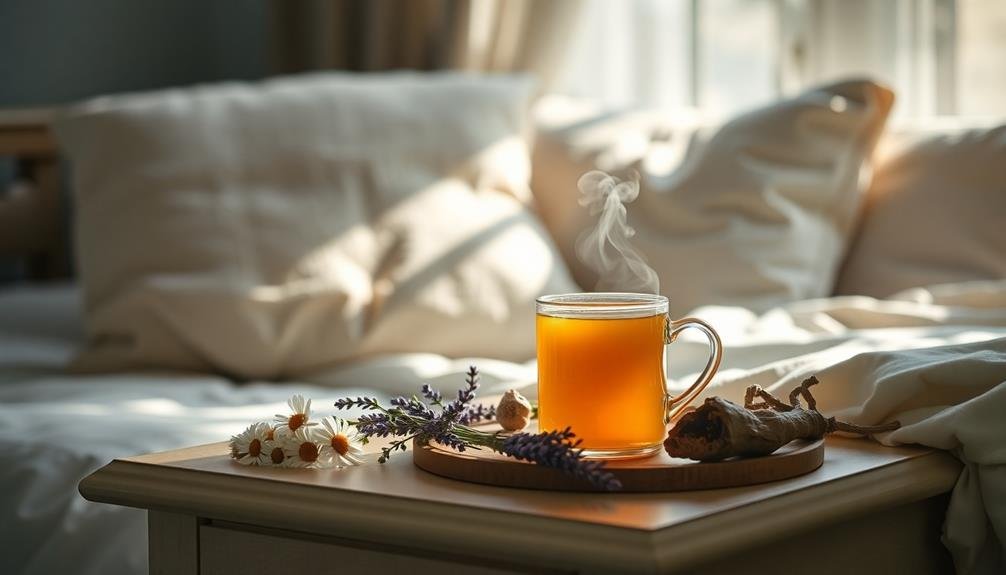



Leave a Reply